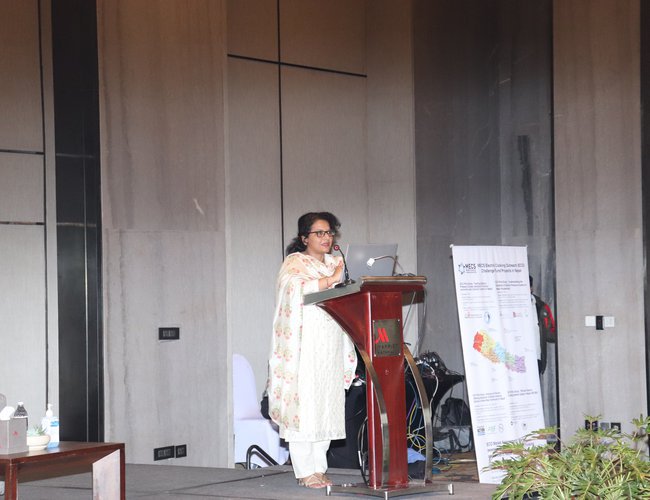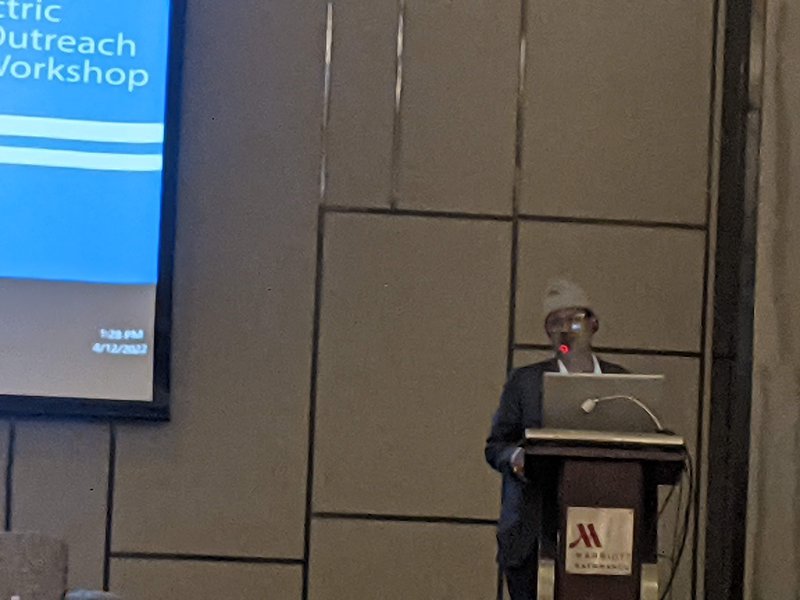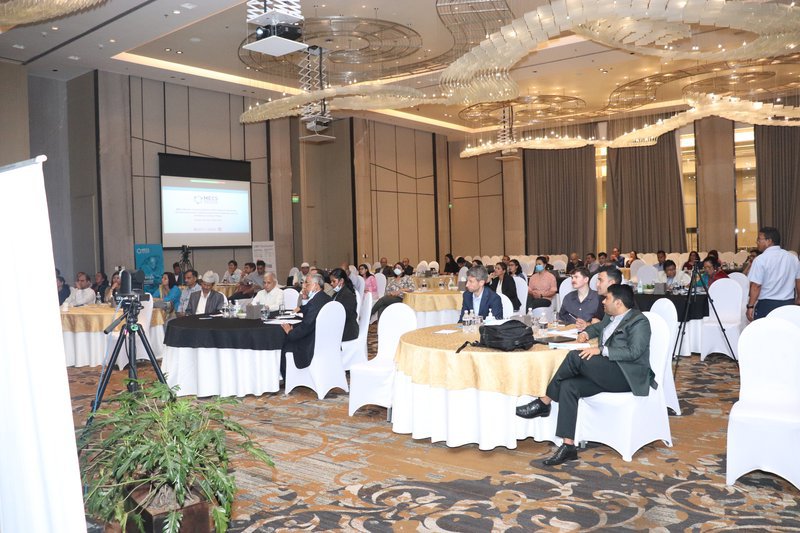
As Nepal is preparing for the local elections in the midst of scarcity of LPG due to a rise in oil prices globally, some elected local leaders have already offered Electric Cooking as a source to minimize the use of LPG.
With the support from the Alternative Energy Promotion Center (AEPC) and municipal resources, Ram Chandra Dahal, Chairperson of Mahankal Rural Municipality of Lalitpur District, has already supplied electric cooking appliances to all 2305 households aiming to reduce the reliance on LPG.
With the limited capacity of E-cooking appliances, existing electricity distribution systems and irregular supply of electricity, E-cooking cannot completely replace the LPG and biomass, but the experience of Mahankal Rural Municipality has shown that e-cooking can minimize the use of LPG.
As the election is coming closer, Dahal announced sustaining and upgrading e-cooking in his rural municipality as an election agenda. Dahal said that E-cooking is his elections agenda for the forthcoming poll.
“Compared to LPG and other traditional energy sources like fuelwood, E- cooking is cheap and clean. Thus, it is popular among people. Households have been using electricity for all cooking minimizing the use of LPG,” said Dahal. “Our experiences have shown that uninterrupted and quality supply of electricity can lure more people towards E-cooking.”
“Launched by Dilli Ghimire in 1998, the community electrification campaign electrified all 19 formerly village development committees of Southern Lalitpur and Mahankal was one of them. After the earthquake of 2015, people have started to replace bio-gas with LPG and electric cooking is used to reduce the dependency on LPG,” said Dahal in his remarks in the recently organized MECS ECO Workshop. “Dilli Ghimire has been guiding us to sustain the E-cooking in our Rural Municipality.”
With 60 percent subsidy from the Alternative Energy Promotion Center (AEPC) and 40 percent of Rural Municipality and 132 cooking appliances donated by People Energy and Environment Development Association (PEEDA), each household received support for the improvement of house wiring and cooking appliances.
“Facilitated by Ghimire, we have made a deal with AEPC and PEEDA to transform our kitchen using e-cooking in our municipality,” said Chairman Dahal.

At a time when there is no sign of receding the global oil price any time soon and it will be impossible for Nepal to arrange the foreign currency required to import the LPG, minimizing the use of LPG can make differences.
The model adopted by Mahankal Rural Municipality in collaboration with government agencies and NGO to use E-cooking can be replicated in other areas as well.
As Nepal will have over 2500 MW of surplus hydroelectricity from the middle of June, this is the right time to encourage people to use e-cooking. For this, the government has to invest money to improve the distribution system. Published by PEEDA with lead author Biraj Gautam, executive director, Nepal e-Cookbook has also revealed that E-cooking can reduce the use of LPG.
According to CBS energy consumption data analysis, 53.3 percent of urban and 8.7 percent of rural populations use LPG for cooking, making it the second most used fuel. Similarly, 63.6 percent of the households use biomass for cooking, out of which 52.4 percent solely use it as the main cooking fuel. The use of bio-mass including fuelwood increases indoor air pollution killing around 24,000 people annually and contributing to increased heart and respiratory-related diseases.
The use of biomass and fuelwood has been killing people, particularly women and the import of LPG has been hurting the economy, Nepal is in a very difficult situation in deciding energy choices. The presentation and discussion held during the MECS Eco workshop try to give some solutions.
Attended by Nepalese and research scholars and experts from Nepal and abroad, community leaders, government officials, and local political leaders, the workshop is the first of its kind to have broader participation of all stakeholders.
Unveiled by a member of the National Planning Commission Professor Dr. Surendra Labh Karna and chairperson of Mahankal Rural Municipality Dahal, Nepal e-Cookbook was a major part of the workshop.
NPC member professor Dr. Karna also unveiled Nepal e-Cookbook. Published by People, Energy and Environment Development Association (PEEDA) with support from Modern Energy Cooking (MECS) Services, Loughborough University and University Bristol and funding from UK aid, the e-book aims to spread awareness of the benefits of e-cooking services. He also said there is a need to make e-cooking devices more Nepalese kitchen-friendly with a capacity of cooking with larger pots as well.

Published in Nepali and English languages, the book highlights the issues like why is electric cooking future for Nepal, how to make the most of your electric pressure cooker and most importantly, the book.
Electric Cooking Vs LPG
Led by Minister of Energy, Water Resources and Irrigation Pampha Bhusal, the campaign to replace LPG by Electric Cooking is heating the use of energy debate now.
Minister Bhusal has been calling to replace LPG by using Electricity. Given Nepal’s current state of electricity supply, distribution systems and house wiring, replacing the LPG is just as a good slogan. However, the use of LPG can be minimized.
The use of LPG against the traditional biomass and wood-based fuel has greater health advantages as well. WHO’s studies have also shown that LPG reduces indoor air pollution by 90 percent compared to a traditional bio-mass. The use of LPG also reduces deforestation. However, the book said reliance on LPG is not sustainable in the long term due to its non-renewable nature as fossil fuel and cost of import.
With certain advantages, the import of LPG has increased over threefold in the last decade from 100,000 MT in 2010 to over 450,000 MT in 2021. This is putting pressure on Nepal’s foreign currency reserve. Observing the cooking cost using different stoves, PEEDA’s study found that the price for cooking rice, dal and meat depend upon the choice of stoves.
PEEDA’s study shows among LPG stoves, firewood, infrared, Electric Pressure Cooker and induction, EPC is the cheapest, with the cost of Rs.6.27 against Rs.11.27 for induction, and Rs.12.60 for infrared, Rs.13.29 for firewood and Rs.13.78 for LPG.
Member of National Planning Commission (NPC) Professor Dr. Surendra Labh Karna said that the transformation of cooking energy is necessary for a country like Nepal to reduce its dependency on imported fossil fuel and other dirty traditional fuels.
Addressing a Modern Energy Cooking Services (MECS) Electric Cooking Outreach National Workshop, member of NPC Professor Dr. Karna said that the launching of the Nepal e-Cookbook is highly important when Nepal is forced to shift from dirty cooking to e-cooking.
He said that the time for the reduction of the use of LPG has come now urging different stakeholders to increase the use of induction stoves, infrared stoves and electric pressure cookers.
Professor Dr. Karna holds the view that there is a need to strengthen the existing distribution system to make the electricity supply reliable and efficient. Thanking the organizer for hosting the workshop, Professor Dr. Karna said that National Planning Commission will accommodate the suggestions and experiences shared by the workshop on national energy policy.
Despite the commitment to promote e-cooking in the country, Nepal Government is yet to allocate adequate resources to improve the distribution system, constant power supply and subsidies to make electric cooking cheaper.
“Now is the time for taking bold action. Let’s take the full advantage of access to electricity and technology advancement - evidence, data, and information from our research will definitely support in accelerating low carbon sustainable development by adopting #ElectricCooking solutions,” said Pooja Sharma, Practical Action Consulting (PAC) presenting on MECS Electric Cooking Outreach (ECO) in Nepalese Research Overview: Key Findings.
AEPC In Electric Cooking
Nepal has already expressed its commitment to the global level through Nationally Determined Contribution (NDC) that Nepal will make electric cooking a primary cooking method in 25 percent of the households by 2030.
To achieve this target, Nepal needs to spend a reasonable amount of resources on this end. As a leading government agency, the Alternative Energy Promotion Center (AEPC) has been working to achieve the government target by mobilizing internal and external resources.
“The government has already made it clear that electric cooking will be given high priority to reduce the use of LPG and other traditional energy sources,” said Dr. Madhusudan Adhikari, Executive Director of Alternative Energy Promotion Center (AEPC) .

Dr. Adhikari called for all stakeholders and development partners to work together to make Nepal a country for e-cooking. He said that APEC is launching a national-level drive for e-cooking to meet the target set by SDGs.
He said that AEPC has been providing e-cooking devices to the people in need adding the distribution of 50,000 e-cooking devices with the support from the British Embassy has already started.
To meet the target of 2030, APEC with the funding from Global Climate Fund is distributing 1 million clean e-cooking devices in Nepal in five years. Adhikari said that AEPC will distribute 200,000 e-cooking devices annually.
Piloting of Electric Cooking
Various organizations have been implementing piloting projects in different districts to promote Electric Cooking by providing Electric Cooking devices to the household.
“To support electric cooking promotion in Nepal, PEEDA, with the support from the University of Bristol and Modern Energy Cooking Service (MECS) program, Kathmandu Alternative Power and Energy Group and many other experts, has been conducting research to understand precisely how electric cooking should be rolled out to Nepali kitchen,” said Biraj Gautam, CEO of PEEDA.
To see the effectiveness and adaptability of electric cooking in low-income communities, Winrock International has been piloting a project in the Rautahat district.
Fifty households in Katahariya Municipality participated in the six-month pilot which assessed whether electric pressure cookers (EPCs) were compatible with consumer preferences and the local electricity infrastructure.
Twenty households from disadvantaged groups (DAG) – either ethnic minorities or economically poor – were included to see how e-cooking preferences and uptake compared with the 30 non-disadvantaged households.
Sharing experiences of e-cooking in two wards of a municipality of Rautahat District, Govinda Khanal of Winrock International said that Nepal has demonstrated clear uptake of e-cooking. Khanal highlighted efficient electric cooking market uptake in Nepal: e-cooking in low-income communities of Rautahat.
Pooja Sharma, PAC and Dr. Ashma Vaidya from Ajummery Bikas Foundation presented findings on factors affecting the adaptation of electric cooking devices in a community-based rural electrification entity.
Ashutosh Sharma and Saumya Vaish from IRADs presented findings on electric pressure cooker adoption of electric cooking devices in a community-based rural electrification entity.

In his presentation, understanding the suitability of electric pressure cookers in on-grid and off-grid households, Biraj Gautam of PEEDA highlighted how important electric cooking is for health and the environment. He talked in detail about various aspects of e-cooking in Nepal.
Richard Sieff from Modern Energy Cooking Service MECS highlighted global experiences of MECS in e-cooking and its advantages over other energy for cooking.
Facilitated by Mohan Das Manandhar, Modern Energy Cooking Services (MECS) experts presented papers and findings in the workshop.
Supported by Modern Energy Cooking Services (MECS) with UK Aids Fund through the Loughborrough University, UK, the research testing electric cooker adaptation in socio-economic and cultural of Nepal has also come out with very relevant results to promote e-cooking in Nepal.
The research encompassed four 6-month pilot studies which monitored uptake and consumer experiences of eCooking with over 300 households. Based on the research findings, the workshop aims to inform policymakers, investors, and other key stakeholders of the clear opportunities and potential challenges for scaling up e-cooking in Nepal.
At the function jointly organized by MECS, Winrock International, Practical Action Consulting, Practical Action, People, Energy & Environment Development Association (PEEDA), and Integrated Research & Action for Development (IRADe), experts presented the findings from the first large-scale, evidence-based research on electric cooking (e-cooking) in Nepal.
Moderated by Mohan Manandhar, the second part of the workshop began with the formation of six parallel groups. The group discussed key themes identified by the MECS Nepal research: after-sales service, promoting e-cooking, reaching the last mile, product standards, supply-side infrastructures and coordinating activities.
As the Nepal government is planning to expand electric cooking throughout the country, the discussion on evidence-based research and experiment is highly relevant. At a time when Nepalese political parties are in a campaign for local level elections, dissemination of the research finding will help them to make electric cooking an agenda for elections.

Keshab Poudel
Poudel is the editor of New Spotlight Magazine.
- HELVETAS NEPAL’S RIVERBED FARMING: Shift From Overseas To Local Farming
- Jul 26, 2024
- POLITICAL SCENARIO : K.P. Sharma Oli's Resurgence
- Jul 21, 2024
- UNDP/MinErgy: An Inventive Approach To Clean Brick Kiln
- Jul 19, 2024
- HELVETAS NEPAL: Nutrition Through Riverbed Farming
- Jul 18, 2024
- NOU Opens To All: Dr. Shilu Manandhar Bajracharya, Vice Chancellor
- Jul 15, 2024
















